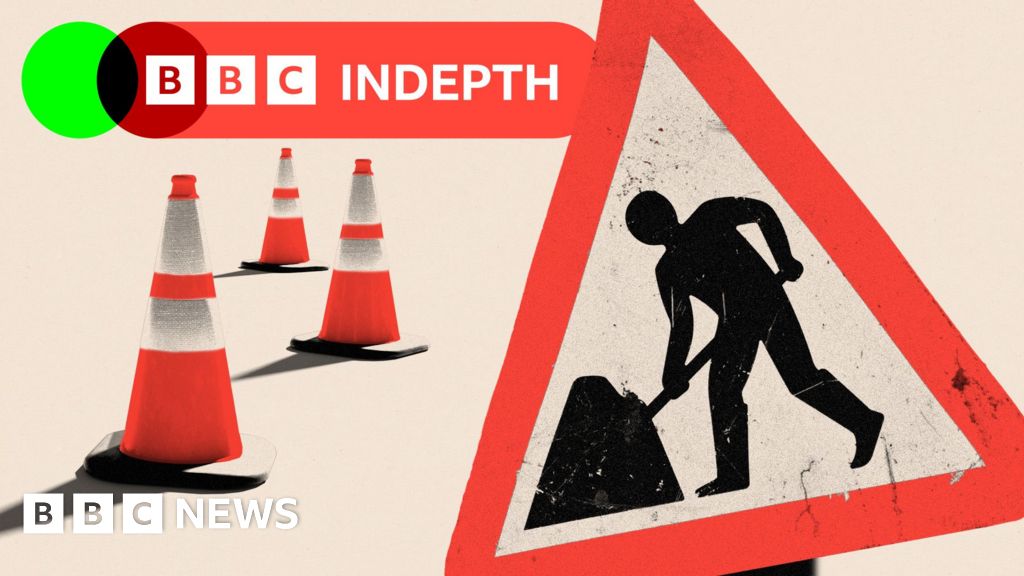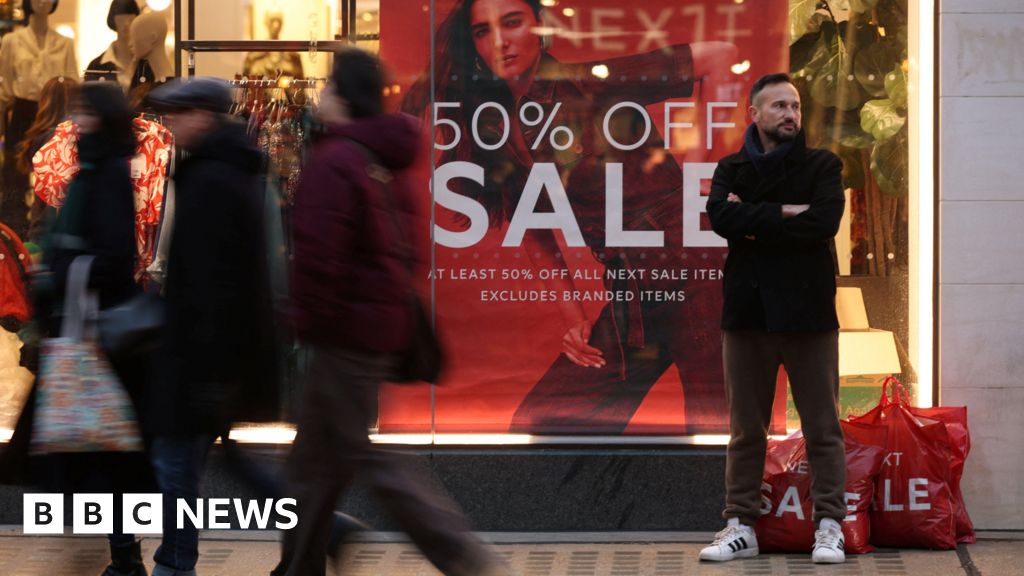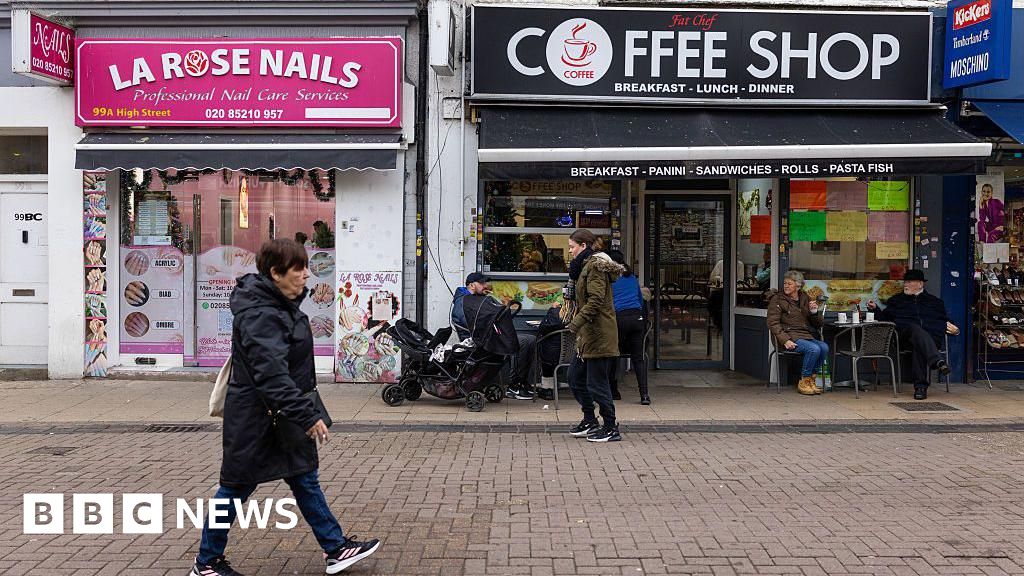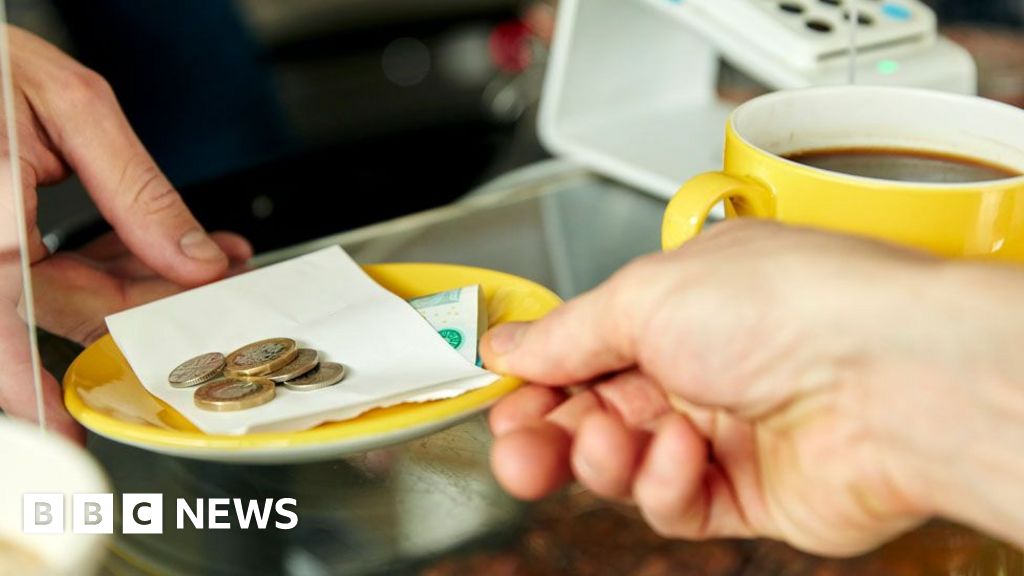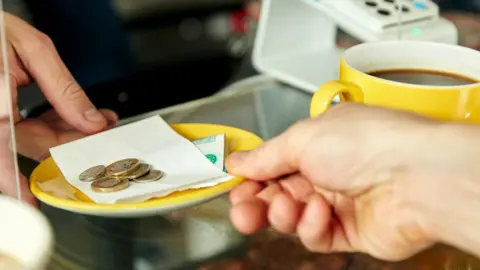 Getty Images
Getty ImagesStaff must be given 100% of tips from customers under a new law which bans businesses from withholding gratuity payments.
More than three million workers across restaurants, cafes, pubs, hairdressers and taxis should benefit from legislation which comes into force on Tuesday and means all tips – whether in cash or by card – must be shared between workers.
If a company breaks the law and retains tips, a staff member will be able to bring a claim to an employment tribunal.
Many have welcomed the change, but some warned it could burden businesses with extra costs.
Nisha Katona, owner of Mowgli Street Foods, told the BBC the change was needed because “young people depend on the law to protect them” from employers who might avoid sharing tips with staff.
However, while she supported the legislation, she believed it would hit some companies that were unprepared.
“There are going to be some casualties because of this law,” she said.
Under new Tips Code of Practice, all gratuities must be passed to employees by the end of the following month from when they were received.
Bryan Simpson, hospitality organiser for the union Unite, said the law was “massively welcome” for employees.
“These are the lowest paid workers in the British economy and they are going to benefit massively from this,” he told the BBC’s Today programme.
In 2021, the UK government said 80% of all tipping was taking place with a card, suggesting it had become easier for businesses to keep the money.
The Department for Business and Trade has predicted the new law will mean a further £200m will be received by workers rather than their employers.
“The people working in hospitality are the lifeblood of our sector and these changes rightly ensure tips hard-earned through excellent service will end up entirely in their pockets,” said Kate Nicholls, chief executive of trade body UK Hospitality.
But she claimed the policy was “another example of costs being placed on a sector that can least afford it”.
‘It gives people a level of protection’
 Tom William
Tom WilliamTom William works in property development, but he used to work for a chain restaurant which took 3% of the value all the food and drink that serving staff sold off their salary – regardless of whether or not customers had tipped.
“I’m delighted about the new law because it gives people on the lowest forms of income and shiftwork a level of protection,” he says.
“There’s such high turnover in these professions. What happened in my experience was that they said: ‘If you don’t hand over your 3%, then we won’t employ you anymore.'”
‘The tips are for their service’
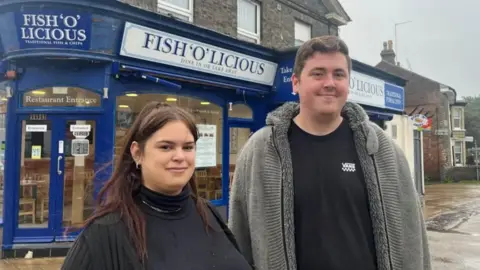 Andrew Turner/BBC
Andrew Turner/BBCTom Howes and Dory Czicza both work at Fish’o’licious, a fish and chip restaurant and takeaway in Great Yarmouth.
She is a waitress and gets tips, but he does not.
Dory, 28, said: “The tips that we get on card, we take it straight out of the till and put it in the pot as cash.”
Tom added: “I’m the fryer and I don’t get the tips. I get paid a little extra. The tips are for their service – it’s not for the business.”
How much should you tip?
Opinions vary on how much customers should tip.
According to VisitLondon, the official tourist guide for the city, a 10-15% tip is customary when eating out in the capital or anywhere else in the UK.
It adds it is also typical to tip taxi drivers around 10% to 15% for black cabs and minicabs in London, but for taxis generally the expectation is that riders round up their payment to the nearest pound and allow the driver to keep that.
Tipping in bars and pubs is not expected.
However, Ms Nicholls does not believe there are hard and fast rules on tipping in the UK.
“Rather it is left in the hands of the customer to tip what they feel is acceptable,” she says.
“This is unlike other countries, like the US, where a tip is typically expected to be added by the customer, regardless of service standard.”
‘Much-needed clarity’
Some companies have faced criticism for holding back some or all of the tips meant for staff or for not distributing them fairly.
Unite’s Mr Simpson told the BBC: “We’ve got issues already coming up with some major brands such as Miller & Carter.”
He claimed that the general manager at the steakhouse chain decided how tips were divvied up. “That isn’t democratic and what that has led to is an unfair distribution of tips,” he said.
Miller & Carter’s parent company Mitchells & Butlers said it welcomed the new law which it said brought “much-needed clarity”.
It said: “For many years we have followed the main principles of the new Tips Code of Practice, including, but not limited to, passing on 100% of tips to our team members by encouraging teams, in each business, to decide how best to allocate tips between themselves.”
The company said its policy had been reviewed in light of the new legislation “by an independent professional adviser to ensure that we remain fully compliant”.
Emma Webb from The Kitchen in Ilminster, Somerset, said the new rules would not change anything for her business.
“We have jars with everybody’s name on them and at the end of the day all the tips get shared out between all of the staff,” she said.
“If customers give a tip through the card machine I get my staff to print off the receipt so I take the tips out of the till and put them in the jar.”
The law has not been introduced in Northern Ireland, which Unite said was “completely unacceptable”.
The Northern Ireland executive has been contacted for comment.
Labour’s Justin Madders, Minister for Employment Rights, said the policy was “just the first step of many in protecting workers and placing them at the heart of our economy”.



















